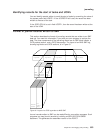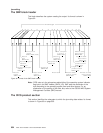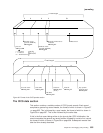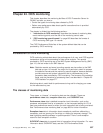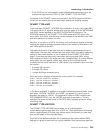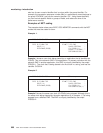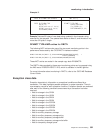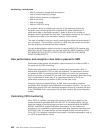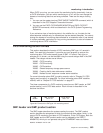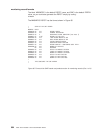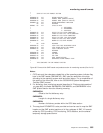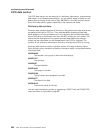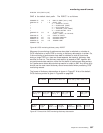
Example 3:
Example 3 shows 32 bytes of user data being updated in the character string
reserved for that purpose. The updated data starts at offset 0, and the data is not
more than 32 bytes in length.
DFHMCT TYPE=EMP entries for DBCTL
The following MCT entries make use of the two event-monitoring points in the
performance class used by the CICS-DBCTL interface modules:
These MCT entries are coded in the sample copy book DFH$MCTD.
The DBCTL data recorded by these event monitoring points can be mapped using
the IMS macro DFSDSTA DSECT=YES, which is available in the IMS genlibs.
For more information about monitoring in DBCTL, refer to the
CICS IMS Database
Control Guide
.
Exception class data
Exception class data is information on exceptional conditions suffered by a
transaction. This data highlights possible problems in system operation. There is
one exception record for each exception condition. Exception records are produced
after each of the following conditions encountered by a transaction has been
resolved:
v Wait for storage in the CDSA
v Wait for storage in the UDSA
v Wait for storage in the SDSA
v Wait for storage in the RDSA
v Wait for storage in the ECDSA
v Wait for storage in the EUDSA
v Wait for storage in the ESDSA
v Wait for storage in the ERDSA
v Wait for auxiliary temporary storage
v Wait for auxiliary temporary storage string
v Wait for auxiliary temporary storage buffer
v Wait for auxiliary temporary storage write buffer
v Wait for temporary storage queue
EXEC CICS MONITOR command MCT entry
EXEC CICS MONITOR DFHMCT TYPE=EMP, *
POINT(13) CLASS=PERFORM, *
DATA1(address of data) ID=(PROG3.13), *
DATA2(length of data) PERFORM=MOVE(0,32)
ENTRYNAME(PROG3)
DFHMCT TYPE=EMP,ID=(DBCTL.1),CLASS=PERFORM,PERFORM=(MOVE(0,256)), *
FIELD=(1,RMIDATA)
DFHMCT TYPE=EMP,ID=(DBCTL.2),CLASS=PERFORM,PERFORM=(DELIVER)
monitoring—introduction
Chapter 24. CICS monitoring 661



